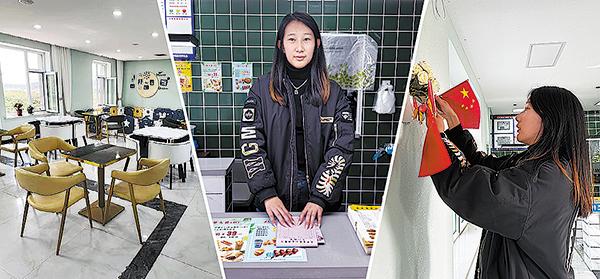
The word "Yongfeng" in Chinese means eternal abundance and perpetual prosperity. It is also the name of a village nestled within the serene landscapes of Shizui town, Panshi city in Northeast China's Jilin province. And just as its name suggests, Yongfeng village is blessed ground in the eyes of 23-year-old Jin Wanting. It is a place that intertwines her past and future.
Growing up in Yongfeng village, Jin cherished carefree days playing hide-and-seek with friends in the fields and gathering around roast corn and sweet potatoes in winter. These joyful childhood moments, filled with freedom, became her most precious memories.
When she ventured to Changchun, the capital city of Jilin province, for higher education at Changchun Normal University, the fast-paced city life made her yearn for the simplicity and vibrant warmth of her hometown.
"Every time I return home and see the familiar landscapes, I feel an overwhelming sense of peace," Jin said.
While in college, Jin majored in computer science and technology, initially planning to become a programmer or a computer science teacher. However, during graduation season, an invitation from the village officials and residents changed her mind.
"The village is thriving, and it's in need of skilled young individuals. I saw returning to the village as a great opportunity, a chance to both challenge myself and contribute to my hometown," she said.
After graduating, Jin returned to Yongfeng village and became the manager of a Western-style restaurant there.
Jin's daily responsibilities involve managing operations, providing explanations to visitors, and handling public relations, all of which present both a challenge and an opportunity for her personal and professional growth during her post-graduation phase.
"Every day, I come into contact with various guests and encounter many unexpected situations," Jin said. "These experiences have significantly improved my ability to react on the spot and my communication skills."
The entire restaurant staff consists of local villagers, many of whom have watched her grow up. That's why Jin navigates her managerial role with a blend of professionalism and humility. "We maintain a clear boundary between personal and professional life. But in situations where my social experience falls short, I'm always willing to seek guidance from fellow colleagues without hesitation."
Before Jin joined the restaurant, most of its customers were young tourists because older people usually prefer traditional Chinese cuisine over Western dishes.
However, including Chinese dishes on the menu comes with certain challenges: they take longer to prepare, which could burden the restaurant's operations.
To remedy this situation, Jin and the chefs meticulously developed several fast-casual dishes by blending Western elements with Chinese ingredients. Upon their introduction, these dishes quickly gained popularity and acclaim among older customers, effectively broadening the restaurant's customer base.
To enhance the restaurant's appeal to Gen Z customers, Jin employed strategies tailored to their preferences. For example, she regularly shares special offers and cooking tutorials on the restaurant's social media accounts while occasionally hosting promotional events. This approach has successfully drawn the interest of numerous online enthusiasts, inspiring them to visit Yongfeng village and dine at her restaurant.
"In the future, I plan to run these accounts more diligently, and maybe introduce our own souvenirs, ensuring that customers, once they visit, are enticed to return," Jin said.
In 2017, Yongfeng village was known as a poverty-stricken area, but with the help of China's poverty alleviation efforts and rural revitalization initiatives, the village lifted itself out of poverty within just three years.
The village's rapid development caught the attention of local younger residents who had previously left in search of better opportunities. Thanks to individuals like Jin, there is now a new driving force for their return.
"I personally witnessed the village's transformation from poverty to the integrated development of primary, secondary, and tertiary industries. These changes have brought numerous business opportunities for us young people," Jin said.
She wasn't the first among her peers to return home. Her childhood friend, Lv Shengnan, who had pursued her college education in Yanji, another city in Jilin province, made the decision to return even before Jin did.
Lv now works as a manager of a local tourist villa. "Apart from overseeing my daily managerial responsibilities, I actively contribute to shaping the villa's future development," she said. "I'm trying to apply the fresh perspectives and knowledge I learned in college to benefit our village."
Just like many young people, Jin is concerned about the uncertainty that accompanies making major life choices, whether in big cities or rural areas. However, she believes that uncertainty is a universal experience. Her aspiration is to encourage more young people to consider returning to their hometowns and contributing to their development.
"This isn't just about giving back to our roots. It's also a great opportunity for self-improvement and personal growth," Jin said.